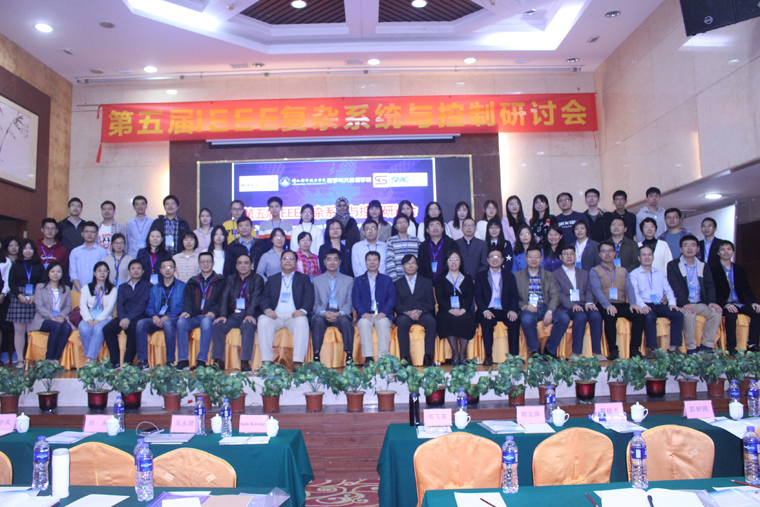Hosted by IEEE SMC Guangzhou Chapter and IEEE CSS Guangzhou Chapter, co-organized by TCCT Stochastic Control Group, and organized by School of Mathematics and Big Data, Foshan University, the 5th IEEE Symposium on Complex Systems and Cybernetics was held in Foshan, China during December 21-22, 2018. 13 academic reports were given at the symposium, including 6 at the Jiangwan Campus of Foshan University on the afternoon of December 21 and 7 at the Vienna International Hotel (Shiwan Hotel, Foshan) on December 22. The theme of this symposium was complex system theories and big data technology.

Professor Zhifeng Hao, president of Foshan University attended the symposium held at the Jiangwan Campus of Foshan University on the afternoon of December 21 and delivered a speech. Over 100 teachers and students from different universities attended the symposium. It was hosted by Professor Feiqi Deng from South China University of Technology, Professor Yongxian Wu from South China University of Technology, Professor Minghui Song from Harbin Institute of Technology and Professor Yiping Luo, vice president of Hunan Institute of Engineering.
On the afternoon of December 21, Professor Feiqi Deng from South China University of Technology, Dr. Zehao Wu and Associate Professor Chufen Wu from Foshan University, Dr. Tianliang Zhang and Dr. Lunan Zheng from South China University of Technology gave academic reports at the Jiangwan Campus of Foshan University, making in-depth discussions concerning leading-edge theories of complex systems and cybernetics. On December 22, 9 Chinese experts on complex system control and big data technology gave academic reports at Shiwan Hotel, including IEEE Fellow, Professor Sam Kwong from City University of Hong Kong, Professor Baozhu Guo from Chinese Academy of Sciences, Professor Feiqi Deng from South China University of Technology, Professor Yiping Luo from Hunan Institute of Engineering, Professor Shiguo Peng from Guangdong University of Technology, Professor Yong Ren from Anhui Normal University, Professor Xiaotai Wu from Anhui University of Engineering, Professor Xiaofeng Zong from China University of Geosciences (Wuhan Campus) and associate Professor Zhiliang Zhao from Shaanxi Normal University. The experts attending the symposium have in-depth discussions on hot issues in the fields of multiobjective evolutionary algorithms, control of distributed parameter systems, synchronization control of time-delay complex networks, control of stochastic systems and control of nonlinear systems.
About Foshan University
Approved by Ministry of Education, Foshan University was established as a full-time general undergraduate university with the authority to award Master’s Degrees. It is located in Foshan, Guangdong Province, an important city in Guangdong-Hong Kong-Marco Greater Bay Area with profound historical and cultural foundation as well as rapid economic and social development. Foshan University originated from Foshan Normal College founded in 1958 and Foshan Branch of South China Agricultural College. In July 2013, approved by Academic Degrees Committee of the State Council, it became Master’s Degrees conferring institution. In September 2015, it was identified as a provincial and municipal high-level university of science and engineering. In 2016, it was included in the list of the sixth batch of post-doctoral innovation practice bases in Guangdong Province. In June 2017, the project of establishing Foshan University as Doctoral Degrees conferring institution was approved by Guangdong Academic Degrees Committee.
The university sticks to the strategy of optimizing the university through talents and strives to build up a faculty team with high morality, high ability, high efficiency and reasonable structure. There are 1501 faculty and staff members, including 1016 full-time teachers. The school has 172 academic staffs with Senior Professional Title, 395 with Sub-senior Professional Title, 511 with Doctoral Degree and 557 with Master’s Degree. Since the launching of constructing a high-level science and engineering university in 2015, the university has recruited 122 high-level talents (including flexible introduction) and 252 outstanding young doctors at home and abroad, among whom are 5 dual-employed academicians. In addition, through the academician workstation, it has brought in 1 academician team, 25 experts from “Cheung Kong Scholars Program”, “The National Science Fund for Distinguished Young Scholars Program” and “10,000-talent Program”, 15 famous overseas university professors and corporate executives, 26 winners of “The National Science Fund for Excellent Young Scholars” and “Provincial Talent Program”. It has fostered 2 of the fourteenth patch of national distinguished experts and 4 Pearl River scholars of Guangdong Province.


